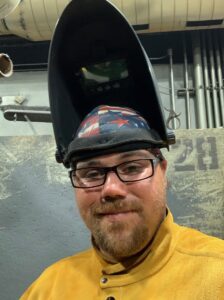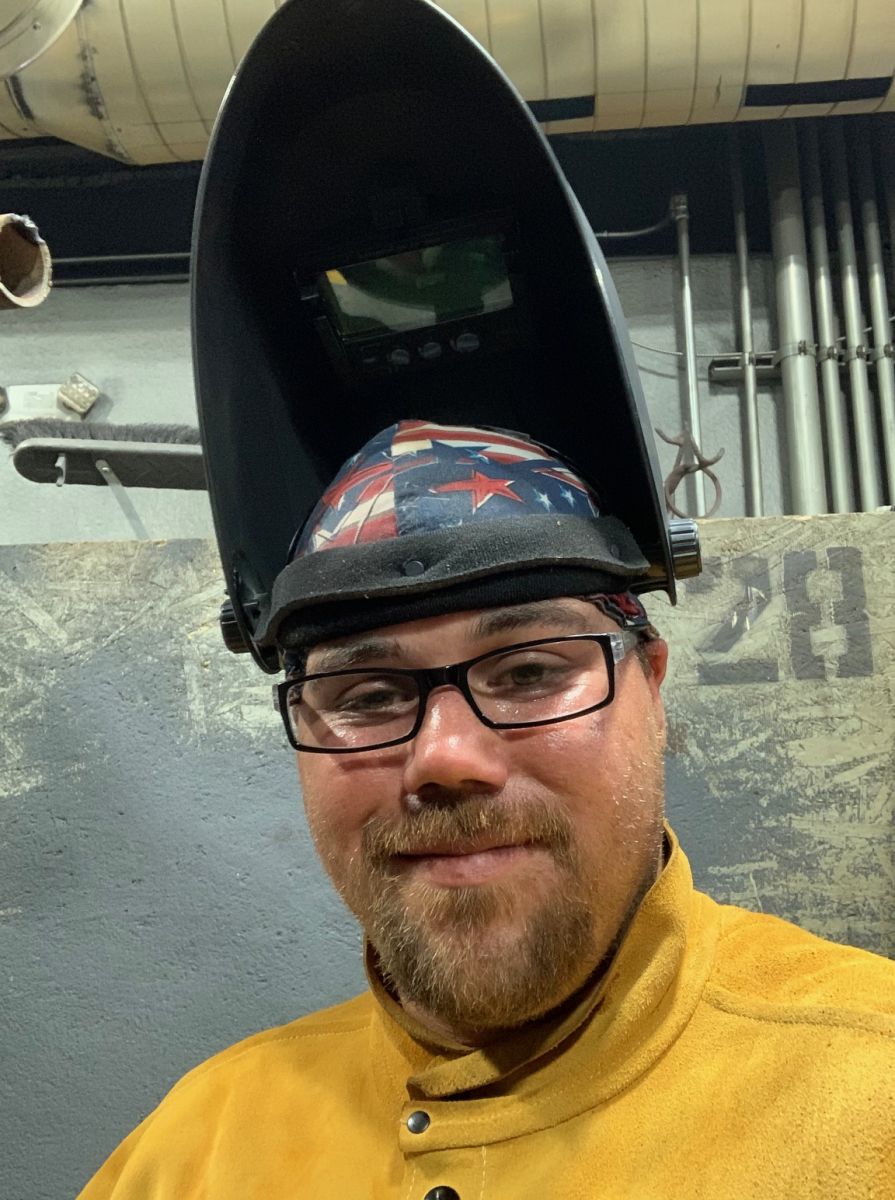RSI is a Great Training Option for Everyone
Learn more about how we can prepare you to advance your career.
Charles, 34, from San Diego, California, completed the seven-month Welding Specialist program at RSI in March 2023 and just walked the stage for graduation in April.
Thanks for your time, Charles; how was your graduation ceremony?
It was a tremendous experience seeing everybody again after almost a month. You see all those faces that you’re familiar with, all your classmates. It was good. I’m glad I went.
So, what did you to before coming to RSI for welding school last year?
I was all over the place. I’ve been all over the U.S. a couple of times. I’ve lived in three other states besides Arizona. I did a lot of work as an auto mechanic, and I also worked in the restaurant industry.
Get Started on the Path to a New Career
Fill out our form to learn how we can help you change your life.
Where did the idea of welding come from?
While having a job is nice, now that I’m 34, it was time for a career. That’s what the school gave me – a career path instead of just a job. The idea of welding came through my dad and uncle. They were both welders in the Navy for 20 years. One day I just decided, why not give it a shot, and see what comes of it?
You decided not to follow them into the Navy?
The main reason for that is because I am an asthmatic. I decided to serve my country in a different way. I was actually a volunteer firefighter for 12 years in San Diego and in Wisconsin when I lived up there. It was the most gratifying thing I’ve ever done without receiving a paycheck.

Had you done any welding with your dad or uncle as a kid?
No, I’d never done any kind of welding until I got to RSI. I’d been around it all my life, but I just thought you know what, if they can do it, I can do it. Let me give it a shot and see what happens!
You gave it a shot, and how did you get on?
Lo and behold, I was a natural! It was really breathtaking to see what I could, not only for myself, but for my dad and uncle to see it too. I would take pictures of my weld tests – from the first phase until my last phase – and send the photos to them. To have them tell me, “Those are the kinds of welds that we were welding in the Navy! Good job, boy!” was just, well, breathtaking to me.
What did you enjoy most about your time at RSI?
I enjoyed the fact that the instructors are more than willing to share their knowledge with you. They are willing to really push you, to make you a better welder than you were when you showed up in their class.
Did you have any reservations about going back to school in your mid 30s?
I definitely had reservations about it because I tried to go to college before, and it didn’t work out. I wondered what I was getting myself into. But it was completely different once I got there, and I got under the hood and started doing my thing. Just having those incredible instructors there to help did a lot. They made it very fun, but when they needed to be hard, they were hard. They got that balance right.
Did you have frustrations? Days when you thought, “What am I doing here?”
All the time! It’s muscle memory, it’s repetitive. You think you get it one day and you leave school on cloud nine! Then you walk in the very next day and it’s like you forgot how to weld! That is very, very frustrating.
How did you deal with that?
I’d walk away from it, go take a quick break, and then come back to it. I’d go over it with my instructors. They’d sit there and talk with me; they told me what I was doing wrong, “You’re forcing your hands” or “You’re overthinking.” And then they’d say, “Don’t overthink it. You know what you’re doing, why are you overthinking it?” So, I’d take a breath, a moment, get some advice, clear my head, and start afresh.
You finished class six weeks ago. Who do you work for now?
I’m an apprentice at the Pipefitters Union, the Local 469 in Phoenix, Arizona. It was a recommendation from one of my instructors. I’m the only one out of my class that joined the Pipefitters Union here in Phoenix. I’m working for a contractor at an Intel location in Chandler. I graduated on March 24, and that following Monday, March 27, I was at work. I actually got the phone call while I was in class at RSI.
Explain a little more about the apprenticeship?
So, with the union it’s a five-year apprenticeship program. They teach you their way to do things, how they want you to weld. There are some slight differences, but for the most part, everything we did at RSI, you’re going to be doing again in the union hall at the training center. It’s a combination of classroom instruction and on-the-job training. You get OTJ training and then one week out of the month you take off work – you still get paid – and go to class for five days. I’m attached to a Journeyman and he’s like a boss, but he’s there to help me understand what I’m doing. After your apprenticeship ends, you turn out as a Journeyman.
So far, I’ve learned how to sweat copper, how to glue PVC, how to press stainless and copper. I’m going to learn a lot; rather than just focusing on welding, I’m learning how to be a good hand. I want to be an apprentice that is well rounded and yet, still knows welding. That’s the path I’m taking. I’m super excited to learn because I’ve never done any of this kind of work.
Are you happy you did the welding program at RSI even though you’re now an apprentice?
Extremely happy. I have a better understanding of what the instructors were talking about when they said, ‘the real world’. Had I not gone to RSI first, I think I’d be behind where I am now. I do have an understanding of what welding is, and how to set stuff up for the welders. Having that previous knowledge helps a lot.
Talk more about that ‘real world’ comment.
When you get into the real world, a job site, things change drastically. There are so many more factors that you have to worry about and it’s really eye-opening to go from school in a controlled environment to a job site. One thing that I always heard when I was at RSI was, “Well, once you get out in the field, things are going to change!” and they do. You’re not going to have the beautiful ISOs (Isometric drawings) that you go over in class. Some of the ISOs that I’ve had to deal with have been train wrecks!
How long do you think you’ll stay there – for the full five years or can you move?
I want to do my entire apprenticeship here and then turn out as a Journeyman. Then, who knows? I might just stay there, or I might travel and go to different states that have work. One of the guys that I used to work with, he just left Chandler to go be on the pipeline up in Alaska. You have that freedom as a Journeyman. As an apprentice, you really don’t have much freedom; you just take your jobs as they come.
Are you happy with the money you’ve started on?
I am very happy with what I am making. It’s a lot more than some companies and it’s a lot less than other companies, but the nice thing is there is so much room for growth that I won’t hit a dead end. I get a 401k, a pension, and really good benefits. That’s something that a lot of younger kids don’t know – how good union benefits really are.
What do you enjoy most about your new trade?
For me, it’s knowing that I’m putting my signature on something that’s going to be around for years to come. If I drive past, I’ll be able to look at that building and be like, “I know what’s in that building on that floor, I know because I was in that building when there was nothing in there.” It’s gratifying. I get a sense of accomplishment knowing that I’m part of something that’s bigger than just me.
Did you make some lasting connections, people you’ll stay in touch with?
I don’t really talk to any of my classmates, but Sam, who’s one of the welding instructors, is constantly reaching out to me, checking up on me, seeing how work’s going, how my family’s doing. I’m like his middleman to people who are thinking about joining the union.
What advice do you have for students to be successful on the welding program at RSI?
Don’t get upset with yourself. Don’t get down on yourself. Keep a positive mental attitude. Just like all aspects of life, you’ll have good days and bad days. If you can stay positive and ask questions, you’re going to do really, really well.
Additional Sources
This blog has been labeled as archived as it may no longer contain the most up-to-date data. For a list of all current blog posts, please visit our blog homepage at https://www.rsi.edu/blog/




